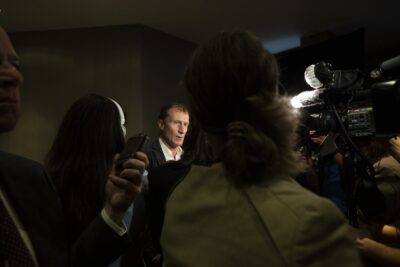Liberal MPs reluctant to lower 2030 and 2035 climate targets
By Canadian Press on September 11, 2025.

EDMONTON — Some Liberal MPs are reluctant to see their government lower its greenhouse gas emission reduction targets for 2030 and 2035, as Prime Minister Mark Carney stays quiet on whether Canada is still committed to meeting its climate goals.
Carney and several of his ministers have created uncertainty in recent days by refusing to clearly reaffirm these early targets, which are intended to lead to carbon neutrality by 2050.
Canada’s commitments under the Paris Agreement include reducing emissions by at least 40 per cent from 2005 levels by 2030.
“Personally, I’m not keen to see these targets reduced,” said Montreal MP and former minister Marc Miller on Wednesday when asked about the targets, which were enshrined in 2021 legislation.
Miller, who was speaking ahead of a Liberal caucus meeting in Edmonton, noted it remains to be seen what option the prime minister will pursue. Carney has been dodging reporters who have been trying to ask him questions since his arrival on Tuesday in the Alberta city where he grew up.
In a speech on Wednesday, Carney reiterated his plan to eventually unveil what he called a “climate competitiveness strategy,” but did not mention the 2030 and 2035 milestones. The strategy, he said, “will focus on results rather than targets, on investments rather than bans.”
On Thursday, he unveiled the first five major projects selected for fast-track approval under new legislation — the Building Canada Act. The projects include an expansion of the Port of Montreal and work to double liquefied natural gas production in British Columbia. The legislation gives federal ministers the power to designate projects as being of national interest based on specific “factors,” which include “contributing to clean growth.”
Once designated, the projects can proceed without having to comply with multiple laws, including the Canadian Environmental Protection Act.
For Miller, if the 2030 and 2035 targets are changed, the government would need to explain “what the goal is, what steps need to be taken to ensure that Canadians can live with an economy that works, but also an environment that is healthy.”
“I think that, precisely for young people and for the people who elect us, it’s very important to have that balance,” he continued.
Ontario MP Nathaniel Erskine-Smith was unequivocal in saying he opposes a revision of the targets.
“Backing away from our climate commitments, if you read (Carney’s book) ‘Values,’ would be a strange thing for us to do,” he said.
B.C. MP Jonathan Wilkinson, who has served as both energy and environment minister, said there is no mechanism under the Paris Agreement that allows Canada to officially lower its targets.
“We can raise the targets, but it’s very difficult to lower them,” he told reporters. “However, the federal government must continue to work toward achieving the targets.”
Erskine-Smith added that he understands the political reasons that led the prime minister to decide to shelve consumer carbon pricing on fuels, commonly referred to as the “carbon tax.”
“If we move away from certain things … we need to emphasize and strengthen things like industrial carbon pricing. So it depends on what the totality (or) entirety of the measures are,” he said, adding that he didn’t yet have the “full portrait” of the situation.
His colleague Chris Bittle, also an Ontario MP, hesitated when asked if he was open to changing the 2030 target.
He finally answered in the affirmative, but seemed uncomfortable as he noted that Edmonton is covered in smoke from forest fires.
“Basically, we have to show that we are strong on the environment and climate change … We can see climate change with our own eyes,” he said.
Heritage Minister Steven Guilbeault, who formerly held the environment portfolio, did not want to comment on the possibility of revising the 2030 and 2035 targets, saying only that “climate change remains a priority issue for (the) government,” and that it “continues to move forward” with measures already in place, such as industrial carbon pricing.
This report by The Canadian Press was first published Sept. 11, 2025.
Émilie Bergeron, The Canadian Press
25-24





Canada can make very little difference in lowering its emissions since it is only one point six percent of the world emissions. That is only 1.6%!
China, the EU and Russia equal almost 60% of world emissions, with China, emitting around 35% alone. China refuses to reduce emissions and is not part of agreements.
If you want to slash all industry that brings in revenues which lower the Canadian debt, before you have alternatives to replace those revenues, which the Liberals began, we will be a bankrupt country and all those services you now enjoy will be gone.
Canada can do very little to impact the world emissions because of the low amount, and many successful carbon capture programs are in place, with more positive results from R&D.
The radicals who want to destroy our way of life in Canada, by fearmongering, continue to pump out misinformation in their propaganda machines!
The Liberals and especially Carnage Carney will soon shed the facade he has done and his true agenda will manifest. Carney was the United Nations Special Envoy on Climate Action and Finance and was behind the UN-backed Net-Zero Banking Alliance, so what do you expect.
How is that promised trade agreement, or massive housing build coming along that he promised? The energy corridor?